State Health Officer Dr. Thomas Dobbs points to a rising positive test percentage as a key indicator that COVID-19 is getting worse in Mississippi. On July 7, he said Mississippi needs a mask mandate, whether local or statewide. Photo courtesy MSDH
Jackson Mayor Chokwe A. Lumumba stood in the gardens outside City Hall in early-summer oppressive heat with a simple message. "I will play the bad guy," he warned. "I will be the one that people are upset with."
It was June 30, 10 days into summer and five days after the Mississippi State Department of Health reported 1,092 new cases of coronavirus disease in a single day.
It was also during a span of time in Jackson when state legislators, including Lt. Gov. Delbert Hosemann and House Speaker Philip Gunn, R-Clinton, were likely contracting the virus during the extended legislative session, which both have announced, amid long meetings and ceremonies with limited social distancing and mask-wearing to retire the Mississippi state flag and complete 2020 legislation.
The week to come would leave Mississippi with the highest per-capita increase of the coronavirus in the nation, NPR's analytics now show.
The mayor, flanked by health-care professionals from across Jackson, announced a mandatory mask order on June 30--a tentative, moderated attempt at real enforcement with one of the internationally recognized solutions to the problem of COVID-19. Cognizant of the ideological rage such a mandate would draw, Lumumba pleaded with the public.
"If you disagree with my politics, if you disagree with any stance of anyone who's telling you to wear a mask--by all means, wear a mask and live to disagree with me another day," Lumumba said.
The grand debate over a protective mask, played out on social media from the local level to the halls of the White House itself, is representative of the state of the pandemic in America. Soaring unemployment has left most states unwilling to consider the kinds of broad shutdowns that followed the virus' initial scouring of the nation to help flatten the curve.
But now, as COVID-19 has spiked in Mississippi and across the nation, and without an abatement many wrongly thought the summer heat would bring, even non-restrictive actions like face coverings have morphed into the realm of the political.
"Mask-wearing has become a totem, a secular religious symbol," Republican strategist Alex Castellanos told The Washington Post on June 30. "Christians wear crosses, Muslims wear a hijab, and members of the Church of Secular Science bow to the Gods of Data by wearing a mask as their symbol, demonstrating that they are the elite; smarter, more rational, and morally superior to everyone else."
His words reflect the vitriol over mask-wearing that have erupted in public spaces, town halls and social media across the nation. "That actually goes to the very top--to the president of the United States," Tupelo Mayor Jason Shelton said in an interview with the Jackson Free Press.
"He's politicized COVID-19. He's not engaged in rational or consistent leadership. ... The White House put out guidelines for responding to COVID-19. ... They were really on point. Somebody did a great job writing them. And then you see the president himself go on TV and ask people not to follow those guidelines."
A Lack of 'Buy-in'
What is not a matter of public debate, however, is that the COVID-19 crisis is worsening in Mississippi, from a spate of newly infected legislators to sharp spikes in those contracting the virus across the state. This is a sobering increase that came since Gov. Tate Reeves almost completely reopened the state, down to tattoo shops, and allowed crowds of up to 50 to gather outside without social distancing. In general, state guidelines suggest 6-feet distancing and masks rather than mandating them.
In recent weeks, every single metric intended to warn of increased COVID-19 spread has peaked, and then peaked again. New cases, long "plateaued" at between 300 to 400 daily cases, spiked to over 1,000, then settled around more than 600 a day. Four of the last seven days have shown an increase closer to 900 a day.
COVID-19 hospitalizations climbed to numbers never before seen, accompanied by reports of rapidly filling ICUs in key hospitals around the state. And the state's positive test rate, a number that resists all attempts to explain rising numbers with a widespread testing regime, spiked and rose above even its previous heights from April, when testing was restricted to those extremely likely to be infected.
State Health Officer Dr. Thomas Dobbs told the Jackson Free Press in a June 23 interview that the boundaries of the state's restrictions were the cooperation of its residents. "(The guidelines) would be a lot more strict if (they) were likely to be successful. We're trying to find a medium where it can be beneficial, but also livable--but folks are not even following that," Dobbs said, visibly frustrated.
In that same interview, Dobbs painted a terrifying image of the upcoming fall and winter, in which rampant COVID-19 hospitalizations meeting the onset of the flu season threatened the integrity of the state's entire health-care system. Days later, after MSDH reported the state's first four-figure coronavirus spike, he suggested such a collapse may only be weeks away.
Dobbs, and later Reeves, at his press conference on July 1, described the problem as a lack of "buy-in" from local communities and populations, a phrase that has gained currency at the top levels of state leadership as positive tests continue to rise.
"There is no doubt that when we look county to county, and we instituted specific restrictions at the county level, that it worked. We made progress," Reeves said. The governor added that "the only way it's going to work is if we have buy-in from our elected leaders, our business leaders and our constituents."
Shelton rejected that line of reasoning entirely, pointing instead to a lack of leadership from the top that would help more people understand that the need to wear masks is urgent. "There's a lack of political will from the governor. There's no lack of buy-in from local leaders," the Tupelo mayor said. "There's certainly no lack of buy-in from the medical community. The health-care community is universal in requesting the masking policy."
Representing "community buy-in" statistically is impossible. But it is possible to examine the timeline of state mandates and compare them to the best metric for viral spread: case positive rate. Increased testing numbers do not affect the percentage of positive tests.
Mississippi's "Shelter in Place" period, which Reeves started on April 3 lasting until April 27, showed the first signs of a reduction in the positive case rate, the "flattening curve" that health experts stressed early in the days of the pandemic, even as much of the public called for the governor to lock down the state. The benefits of the "Shelter at Home" period--and the "Safer at Home" period that followed--are relatively clear. A heavy increase in testing showed a decreased positive case rate, reaching its nadir in late May.
But the end of the "Safer at Home" period--which began April 27 and ended on June 1, and the beginning of the "Safe Return" order, which continues today, shows the marked increase in case positive rate that accompanies the massive swaths of new cases. June's "Safe Return" has been anything but safe--an essentially complete reopening that has bent the curve back upward, imperiled the health-care system and the best-laid plans of municipal leadership, who were limited by how far they could go with safety mandates due to the governor's executive orders.
Oxford's Double-Bind
The messages about how it has handled the coronavirus crisis are mixed from the State of Mississippi. On Sunday, July 5, a Reeves tweet blamed recent large protests in Mississippi--the Black Lives Matter events--for a spike in COVID-19 transmission and taking a swipe at "liberal media" at the same time.
The next day, Reeves walked back those comments on Twitter, suggesting that he was referring to "national" media ignoring the impact of protests. He explained his theory at a press event held in the afternoon.
"There are those in the national media who would have you believe that (protests) had absolutely no impact on the rising number of cases. I would submit to you that common sense says otherwise," Reeves said July 6.
For Mississippi, at least, Dr. Dobbs has previously said that the evidence had not "revealed any specific links to protests." The June 6 Black Lives Matter protest in Jackson drew thousands, but was dramatically different from early May protests to reopen the state: photos and video from June's protest show that nearly everyone participating was wearing a mask.
Repeatedly, Dobbs has acknowledged to the Jackson Free Press that transmission can still happen in smaller groups without masks or social distancing, although Reeves is allowing groups up to 100 to gather outdoors. But Dobbs has also insisted that larger gatherings of individuals ignoring restrictions, groups of college students especially, have caused a significant portion of the current spike.
On Tuesday, July 7, at an MSDH press event, Dobbs encouraged "every community, every city, every county to look at enacting a mask ordinance," to better protect residents, acknowledging that it is his position to advocate for mask-wearing at whatever level possible, including a statewide order, which Reeves has yet to enact.
The rising curve and increasing hospitalizations threaten current plans to reopen the state's schools and colleges in the fall. No city understands the economic threat those plans falling through would present more than Oxford. That city, the home of the University of Mississippi, not only has a citywide mask order, but it has been in place since April 25.
In a June 30 interview, Oxford Mayor Robyn Tannehill said three medical advisers guided her decisions. "From the very beginning, they said the best way to curb that is for everyone to wear a mask," she said.
Oxford is in a double-bind. The state of the virus in Mississippi does not depend on the actions of Oxford. But a fall without college sports and an active, present University of Mississippi community would be devastating to the town economically.
Nor does Lafayette County have perfect knowledge of the spread in their own county. COVID-19-positive residents from out of state are reported back in their home counties and state, not in Lafayette.
That means students can return for parties and fraternity events, infecting, being infected and spreading the virus back to their home communities, as well as getting sick in Oxford, further taxing its health-care system. That could be a serious crisis if and when students return for the fall.
Tannehill called non-compliant residents a "small minority" in Oxford. But she acknowledged that stronger restrictions were necessary, and expressed approval for Lumumba's plan that threatened businesses like restaurants with temporary closures if they were found to be noncompliant, promising to raise the issue soon.
The next day, at the Oxford Board of Aldermen meeting, Emergency Management Director Jimmy Allgood presented a preliminary plan for just such an order. The board has since rolled back the city's opening to phase 1, limiting gatherings beyond the statewide order to 20 people if social distancing is possible and 10 if not. But Tannehill also cast the tiebreaker vote to allow restaurants to stay open past 10 p.m.
'The Best Trump He Could Be'
At his June 20 press briefing, Lumumba chided the people of Jackson for their lack of initiative. "As we contemplated the steps forward, we identified that far too many of our residents have been taking a lackadaisical approach to wearing facial coverings ... far too many people have not taken this deadly virus seriously. And so we stand here with you, not in an effort to over govern, but in an effort to protect our residents to the best of our ability," he said.
When it came to community buy-in, Lumumba said the increased restrictions were an attempt to find a balanced solution to the spreading problem. "We're not trying to abuse people for their sincere failure or forgetfulness, but we are trying to negotiate how we collectively take a more responsible approach to this issue," the mayor said.
For Mayor Shelton in Tupelo, it's the governor who lacks buy-in.
"In his defense, he didn't campaign on being an effective leader or a progressive leader. He campaigned on being the best Trump he could be," the Tupelo mayor said about Reeves.
Earlier, Reeves announced that both he and his family had tested negative for COVID-19. On July, he tweeted a photo of a note his daughter had left on the doorknob to her room: "Put a mask to come in until we get test back."
"Official order on my youngest daughter's bedroom door!" the governor tweeted about his child's mandate. As of press time, that order went further than he has been willing to go with safety precautions for the State of Mississippi.
Email state reporter Nick Judin at [email protected]. Read full COVID-19 coverage at jacksonfreepress.com/covid19.
More stories by this author
- Vaccinations Underway As State Grapples With Logistics
- Mississippi Begins Vaccination of 75+ Population, Peaks With 3,255 New Cases of COVID-19
- Parole Reform, Pay Raises and COVID-19: 2021 Legislative Preview
- Last Week’s Record COVID-19 Admissions Challenging Mississippi Hospitals
- Lt. Gov. Hosemann Addresses Budget Cuts, Teacher Pay, and Patriotic Education

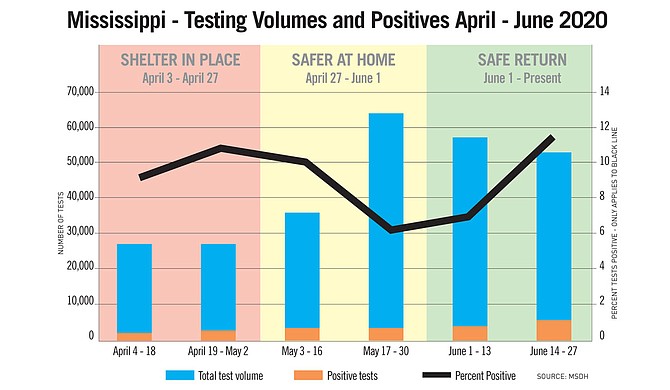
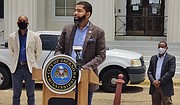
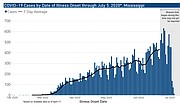
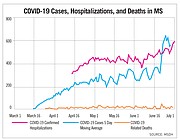
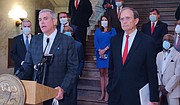

Comments
Use the comment form below to begin a discussion about this content.
comments powered by Disqus